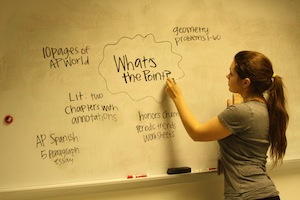After decades of the homework pileup steadily increasing according to The New York Times, America’s international academic ranking is not anything to be proud of to some.
American students fall 17th in reading, 23rd in science and 31st in math, according to results from the Program for International Student Assessment released last December. This data has raised eyebrows across the country about the quality of America’s schools, and more specifically, homework. According to the Economics of Education Review, homework in science, English and history has “little to no impact” on test scores.
People across America have come to different conclusions: schools are assigning too little homework and allowing students’ brains to slip away, or schools are assigning too much homework and working students too hard. In her article “The Trouble with Homework,” Annie Murphy Paul argues a completely different side: maybe the homework American students trudge through each night simply is not effective in enhancing their learning.
“Of course that’s true, some of the time,” Timothy Harig, AP World History teacher, said. “You always have to reassess the work you give to see if it’s valuable. As a student, I did work I didn’t think was interesting or helpful. That’s an ongoing issue.”
Harig is wary to put a number on the amount of hours of homework he assigns each night, but he assigns roughly one 60-page packet a week for his students to complete. He sees his homework not as a burden, but as a necessity to instill knowledge in his students.
“There are people a whole lot smarter than me who have thought about these things years and years before me and you can’t possibly offer that as a teacher,” Harig said. “You have to come up with ways to try to find meaningful things at a challenging level without killing everyone. It’s hard to get the right balance.”
Recent studies have indicated that too much homework may also have negative effects on health. Denise Pope, a senior lecturer at the Stanford School of Education, co-authored a paper which studied 497 students and found that students with more than 3.5 hours of homework a night had an increased risk of physical and mental health issues such as ulcers and headaches. Stress can also result from worrying about completing assignments and lack of sleep.
“You feel like a bit of a slave driver,” Harig said.
In her article, Paul also points out that some teachers assign busy work. While Claire Hubert, freshman, admitted she is sometimes assigned busy work, she is also skeptical of its negative connotation.
“People learn at different paces,” Hubert said. “What I think is busy work, other people might need.”
Katie Coates, junior, said she is often assigned busywork because her teachers want to keep the students occupied. Coates is also skeptical of homework that is reinforcing the lesson, not adding to it.
“Isn’t homework about making us understand the lessons anyway?” Coates said. “So if we do, what’s the point?”
Randy Kriewall, math teacher, agrees with Coates in that he sees homework as practice and reinforcement on the lessons learned in class. The homework Kriewall assigns takes no more than 30 minutes a night, and he often lets his students work on it in class and does not count it for a grade.
“I think what we’re trying to move toward is a little more personal responsibility on the part of the student. So if you need the practice, then practice,” Kriewall said. “But if you have the concept figured out and you can do it efficiently, then you don’t have to do [the practice] anymore.”
Dr. Michael Havener, principal, agrees homework is something to think about. He said teachers do not meet on a regular basis to discuss the homework they’re assigning to see if it’s reasonable.
“We don’t give homework just to be homework,” Havener said. “There should be a purpose behind assigning homework, and it should be a reasonable amount.”
Sherri Kulpa, assistant principal, also said teachers do not regularly discuss the homework assigned. She agrees with Havener about homework being intentional and only there to further the learning, not to fill otherwise empty time. She said KHS has not taken any distinct measures to examine homework quality yet.
“There are no plans that I’m aware of right now,” Kulpa said. “But if we heard from a lot of people that it’s a concern, then we would definitely address it.”
So students will continue completing their many assignments while minds like Harig, Kulpa, Havener and Kriewall try to solve the problem of America’s homework.
“It’s a beast, and a hard one to tame,” Harig said.









